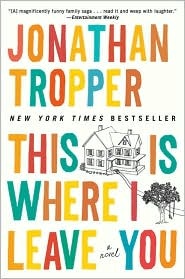My take on “This is Where I Leave You”
Permanent link All Posts

In my line of work, I deal with helping people find their Jewish identity all of the time. In my personal life I struggle with finding “the one.” It's no wonder that “This is Where I Leave You” stayed on my brain for several weeks. Plus, I was lucky enough to meet the author, Jonathan Tropper, at a reading of the paperback in Chicago.
It shook me as I wondered how I could enjoy the journey and the persona of the protagonist, while at the same time loathing his misogynist and superficial summations of women and what a man wants in a woman.
In fact, Judd Foxman, the Jewish male main character, espouses what I’ve suspected men thought all along: if you aren’t a woman who looks like a model, you aren’t much of a woman at all.
Despite my disappointment in Judd, I still adored him. It reminded me of my favorite quote from “Eat, Pray Love,” a book that I initially loved and then wanted to burn at the end of reading it: “I have a tendency not only to see the best in everyone, but to assume that everyone is emotionally capable of reaching his highest potential...I have been a victim of my own optimism.”
Could Judd possibly be as big of an asshole as he seemed? Is this really how men are? How they think?
Mr. Tropper answered my question before a small crowd at Borders earlier this month. He said, there is a part of all men that are like that. However, Judd is wearing the lenses of a man (and this is on the back of the book, so I’m not a spoiler) whose beloved wife has slept with his boss for an entire year and he has just found out about it. He is emasculated, humiliated, and devastated. Of course he is going to look at women negatively.
Okay, Mr. Tropper has rented some sympathy for Judd. But then I realized a guilty truth: had Judd been a woman whose husband had cheated on her, I would have had no problem with the male depictions in the book. It was just jarring to read it from a different perspective. The female characters include three adulterous women, a therapist engaged to her patient, and a mother more eccentric than the Barbra Streisand character in “Meet the Fockers.”
This made me realize that no matter how empathetic I may think I am, at times I will jump to the wrong conclusions about what motivates people and characters to do what they do and think what they think.
In what I think was the most poignant part of the book, Judd realizes what he has thought all along about his relationship with his brother is inaccurate and skewed. I too frequently fall into that pattern—I think most of us do.
At the book reading, I asked Mr. Tropper if he is Jewish. He said that he is (looking surprised that I asked) and that it would have been really gutsy for someone not Jewish to write a book about a family observing shiva. Then he went on to dismiss the notion (which I didn’t suggest at the time, but many others had) that this is a Jewish book.
It's laughable that he doesn’t believe “This is Where I Leave You” is a Jewish book. The only people who might agree with him are Philip Roth and Woody Allen, but I maintain this is one of the most Jewish books to come out in the last few years.
It’s not just the setting that is Jewish, but the conflicts faced by the characters. This doesn’t mean that the book is not appealing to all audiences, but “This is Where I Leave You” deals with Jewish apathy, identity problems, and intermarriage, as well as faithlessness and dysfunctional relationships between parents and their children.
I wouldn't label Mr. Tropper a self-hater, but it did make me sad to see this disdain on his face towards owning his Jewishness positively.
It's such a shame Mr. Tropper isn't Birthright eligible so he could work some of these issues out. I would love to bring Mr. Tropper to a lively Shabbat meal where intellectual issues are discussed. I would love to show him that there can be more to Judaism than lox and bagels.
Mr. Tropper, there's no shame in calling “This is Where I Leave You” a Jewish book, as I doubt Jhumpa Lahir would run from calling “The Namesake” an Indian book. Similarly, the Indian community has lauded her, and if you would let it, the Jewish community would be admirers of your work as well.
Besides, the spread that they will have at the JCC will probably be better than that ice coffee you drank at Borders.



.jpg)



